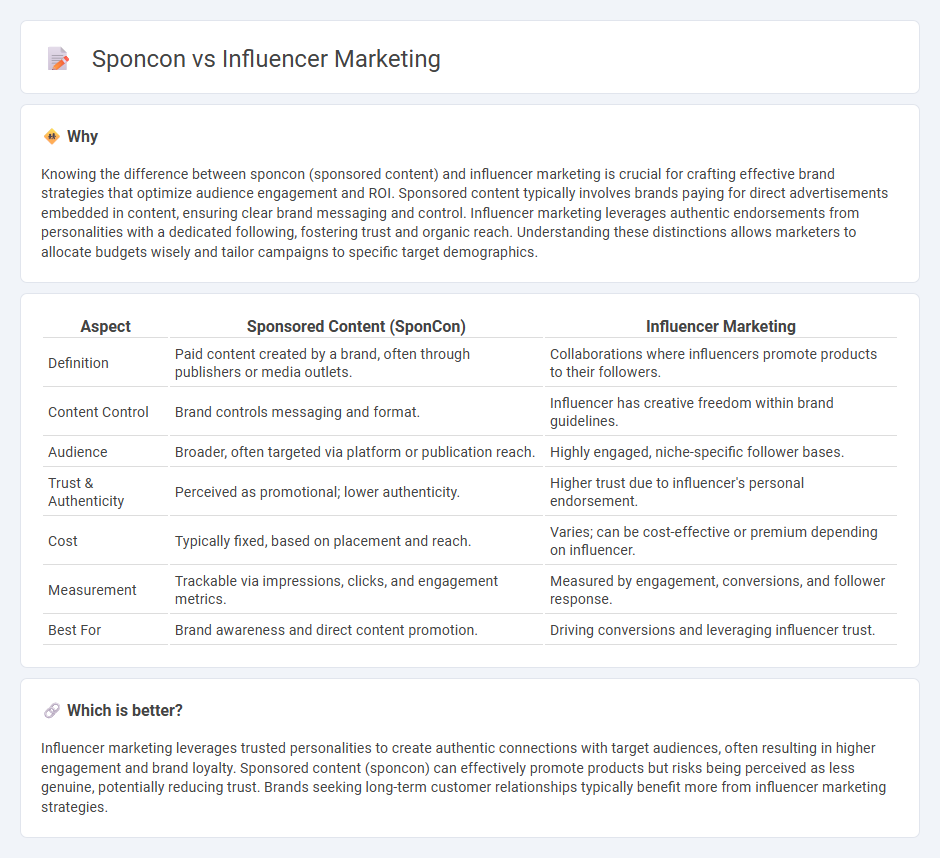
Sponsored content integrates branded messages seamlessly within media platforms to engage target audiences authentically, while influencer marketing leverages trusted personalities to amplify brand visibility and foster consumer trust through personal endorsements. Both strategies harness digital channels but vary in execution, with sponcon focusing on content placement and influencer marketing emphasizing relationship-driven promotion. Discover deeper insights into how these approaches can elevate your marketing campaigns effectively.
Why it is important
Knowing the difference between sponcon (sponsored content) and influencer marketing is crucial for crafting effective brand strategies that optimize audience engagement and ROI. Sponsored content typically involves brands paying for direct advertisements embedded in content, ensuring clear brand messaging and control. Influencer marketing leverages authentic endorsements from personalities with a dedicated following, fostering trust and organic reach. Understanding these distinctions allows marketers to allocate budgets wisely and tailor campaigns to specific target demographics.
Comparison Table
| Aspect | Sponsored Content (SponCon) | Influencer Marketing |
|---|---|---|
| Definition | Paid content created by a brand, often through publishers or media outlets. | Collaborations where influencers promote products to their followers. |
| Content Control | Brand controls messaging and format. | Influencer has creative freedom within brand guidelines. |
| Audience | Broader, often targeted via platform or publication reach. | Highly engaged, niche-specific follower bases. |
| Trust & Authenticity | Perceived as promotional; lower authenticity. | Higher trust due to influencer's personal endorsement. |
| Cost | Typically fixed, based on placement and reach. | Varies; can be cost-effective or premium depending on influencer. |
| Measurement | Trackable via impressions, clicks, and engagement metrics. | Measured by engagement, conversions, and follower response. |
| Best For | Brand awareness and direct content promotion. | Driving conversions and leveraging influencer trust. |
Which is better?
Influencer marketing leverages trusted personalities to create authentic connections with target audiences, often resulting in higher engagement and brand loyalty. Sponsored content (sponcon) can effectively promote products but risks being perceived as less genuine, potentially reducing trust. Brands seeking long-term customer relationships typically benefit more from influencer marketing strategies.
Connection
Sponsored content and influencer marketing intersect through authentic brand promotion by influencers who create and share paid content on social media platforms. This approach leverages the influencer's trust and audience engagement to enhance brand awareness and drive conversions more effectively than traditional advertising. Utilizing data-driven targeting and relatable messaging, brands achieve higher ROI and customer loyalty through strategic influencer partnerships.
Key Terms
Authenticity
Influencer marketing leverages genuine connections between creators and their audience, emphasizing authentic storytelling to build trust and drive engagement. Sponsored content (sponcon) often risks appearing overly commercial, which can undermine perceived authenticity and reduce audience impact. Explore strategies to maintain authenticity in influencer collaborations and maximize campaign effectiveness.
Disclosure
Influencer marketing demands clear disclosure to maintain transparency and comply with FTC guidelines, ensuring that sponsored content is easily identifiable by audiences. Sponcon, or sponsored content, requires influencers to label their posts with hashtags like #ad or #sponsored to avoid legal repercussions and foster trust. Explore further to understand best practices for disclosure and regulatory compliance in influencer campaigns.
Reach
Influencer marketing leverages authentic content creators to amplify brand reach through genuine audience engagement, often resulting in higher trust and organic visibility. Sponsored content (sponcon) typically involves paid promotional posts that prioritize immediate reach but may lack the organic connection found in influencer partnerships. Discover how to strategically balance influencer marketing and sponsored content to maximize your campaign's reach and effectiveness.
Source and External Links
Influencer marketing - Wikipedia - Influencer marketing is a form of social media marketing involving endorsements and product placement from influencers who have expert knowledge or social influence, impacting consumer buying behavior via platforms like Instagram, TikTok, and YouTube.
What Is Influencer Marketing? - Mailchimp - Influencer marketing is a collaboration between brands and individuals with a following to increase brand exposure, requiring clear goals, audience alignment, and budget considerations for effective campaigns.
Influencer Marketing and Why It's Important Today - Influencer marketing leverages trusted personalities within niche communities on social media to provide authentic endorsements that engage targeted audiences, making it key in modern digital marketing due to shifts away from traditional media.
 dowidth.com
dowidth.com